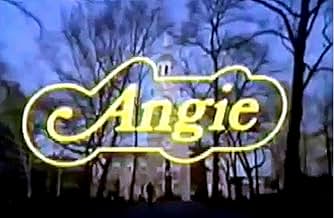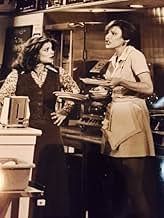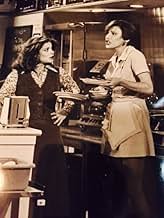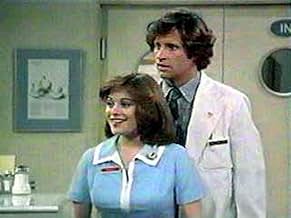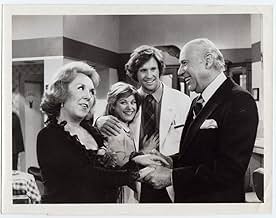Adicionar um enredo no seu idiomaAngie Falco is a middle class Italian-American who marries the wealthy Brad Benson, and she soon learns how to adjust to her new lifestyle the hard way.Angie Falco is a middle class Italian-American who marries the wealthy Brad Benson, and she soon learns how to adjust to her new lifestyle the hard way.Angie Falco is a middle class Italian-American who marries the wealthy Brad Benson, and she soon learns how to adjust to her new lifestyle the hard way.
- Prêmios
- 2 indicações no total
Explorar episódios
Avaliações em destaque
"Angie" was a program that was doomed to last no more than one season. First of all, it ran on ABC in the late 1970s, which pretty much sealed its fate as a ratings flop. Moreover, it had all of the right elements, in the wrong combination. In a way, the show was very ahead of its time. In another, it had very little new to offer.
Donna Pescow played Angie, a working class Italian-American woman working as a waitress in a Philadelphia Diner, who dreamed of a better life. She was often visited by her "rough around the edges" sister, who criticized her conservative nature, and her smothering mother who criticized her lack of a husband. In the third episode, she married Brad, a regular customer at the diner, only to discover AFTER the wedding that Brad was the heir to a huge family fortune. But her new found wealth didn't keep her from working at the diner, especially after Brad bought her the diner for her birthday. Angie turned her downtown restaurant into a success, while living in her uptown penthouse apartment.
"Angie" had a strong cast. It was well written and it's "working class humor" was right for the times. But the "rags to riches" storyline and slapstick humor did little to set it apart from the sea of sitcoms that filled the airwaves in 1979.
Donna Pescow played Angie, a working class Italian-American woman working as a waitress in a Philadelphia Diner, who dreamed of a better life. She was often visited by her "rough around the edges" sister, who criticized her conservative nature, and her smothering mother who criticized her lack of a husband. In the third episode, she married Brad, a regular customer at the diner, only to discover AFTER the wedding that Brad was the heir to a huge family fortune. But her new found wealth didn't keep her from working at the diner, especially after Brad bought her the diner for her birthday. Angie turned her downtown restaurant into a success, while living in her uptown penthouse apartment.
"Angie" had a strong cast. It was well written and it's "working class humor" was right for the times. But the "rags to riches" storyline and slapstick humor did little to set it apart from the sea of sitcoms that filled the airwaves in 1979.
From the moment Maureen MxGovern begins singing "Different Worlds" the Angie theme song I was hooked. The show which originally aired after "Happy Days" had spunk and a great ensemble case including Including Doris Roberts, Donna Pescow, Robert Hays and Debralee Scott.
It was a wonderful sitcom that hit the right spots with the audience and the cast chemistry was delightful. I especially loved Doris Roberts whose character was similar to her "Everybody Lives Raymond" character. Sadly CBS the network kept moving the series around the 2nd year which often kills a show. And it did just that. I suppose it is on some streaming channel today.
It was a wonderful sitcom that hit the right spots with the audience and the cast chemistry was delightful. I especially loved Doris Roberts whose character was similar to her "Everybody Lives Raymond" character. Sadly CBS the network kept moving the series around the 2nd year which often kills a show. And it did just that. I suppose it is on some streaming channel today.
The sitcom was initially the highest-rated new series of 1978-1979 TV series, appearing on schedule in January 1979 (tying with "Mork and Mindy" for that honor). However, unlike the Orsonian goofball, "Angie" was the victim of a massive revamp during its second season and a victim of constant schedule shuffling--moved from night to night, time slot to time slot, repeatedly for months, by ABC until viewers lost interest in searching for it, then abandoned the ship. The only rats here, however, were the ABC executives who, like all network suits, failed to realize the damage that instability does to a potential hit series with immediate high ratings, a lovable heroine, a cast of crazies and the audience. I truly miss this show one-quarter of a century later. Robin Fletcher
What went wrong? Debralee Scott, Donna Pescow, Robert Hays, awesome theme song. Too bad I was too young to truly appreciate the writing and character development. How about a reunion?
This show had the longest theme song of any sitcom that I have ever seen!
I remember watching this show every day. This show was as much a part of my childhood as most of the other sitcoms.
The time I watched it was during the summer before I started fifth grade.
The mother on this show is the same mother on Everybody Loves Raymond. She had brown hair back then!
I don't remember much about this show.
I just remember the extremely long theme song.
I can't believe I actually heard a minister quote the lyrics to this theme song almost 20 years later.
I remember watching this show every day. This show was as much a part of my childhood as most of the other sitcoms.
The time I watched it was during the summer before I started fifth grade.
The mother on this show is the same mother on Everybody Loves Raymond. She had brown hair back then!
I don't remember much about this show.
I just remember the extremely long theme song.
I can't believe I actually heard a minister quote the lyrics to this theme song almost 20 years later.
Você sabia?
- CuriosidadesThe opening song "Different Worlds" was sung by Maureen McGovern.
- ConexõesReferenced in Battle of the Network Stars VII (1979)
Principais escolhas
Faça login para avaliar e ver a lista de recomendações personalizadas
- How many seasons does Angie have?Fornecido pela Alexa
Detalhes
Contribua para esta página
Sugerir uma alteração ou adicionar conteúdo ausente

